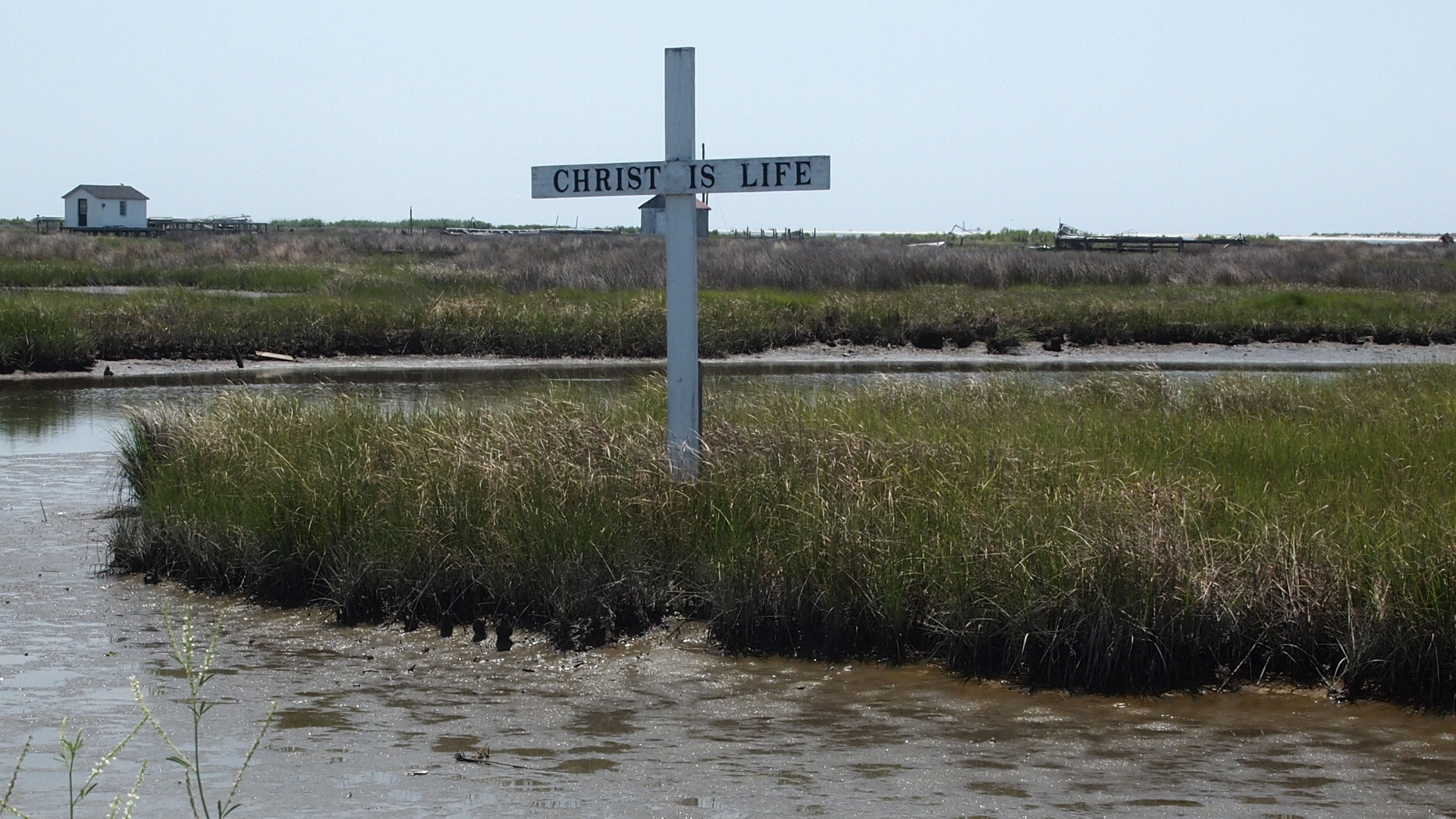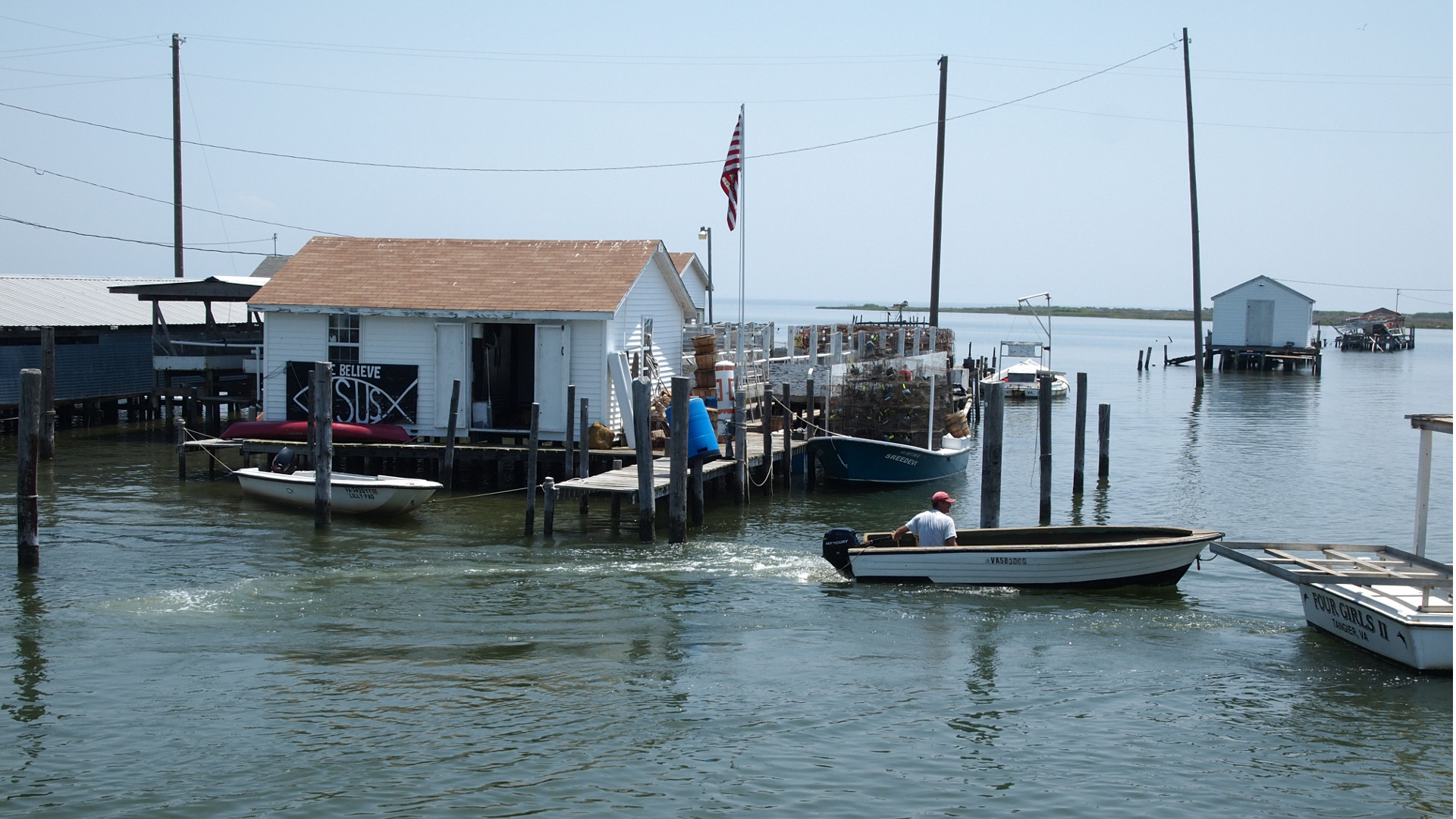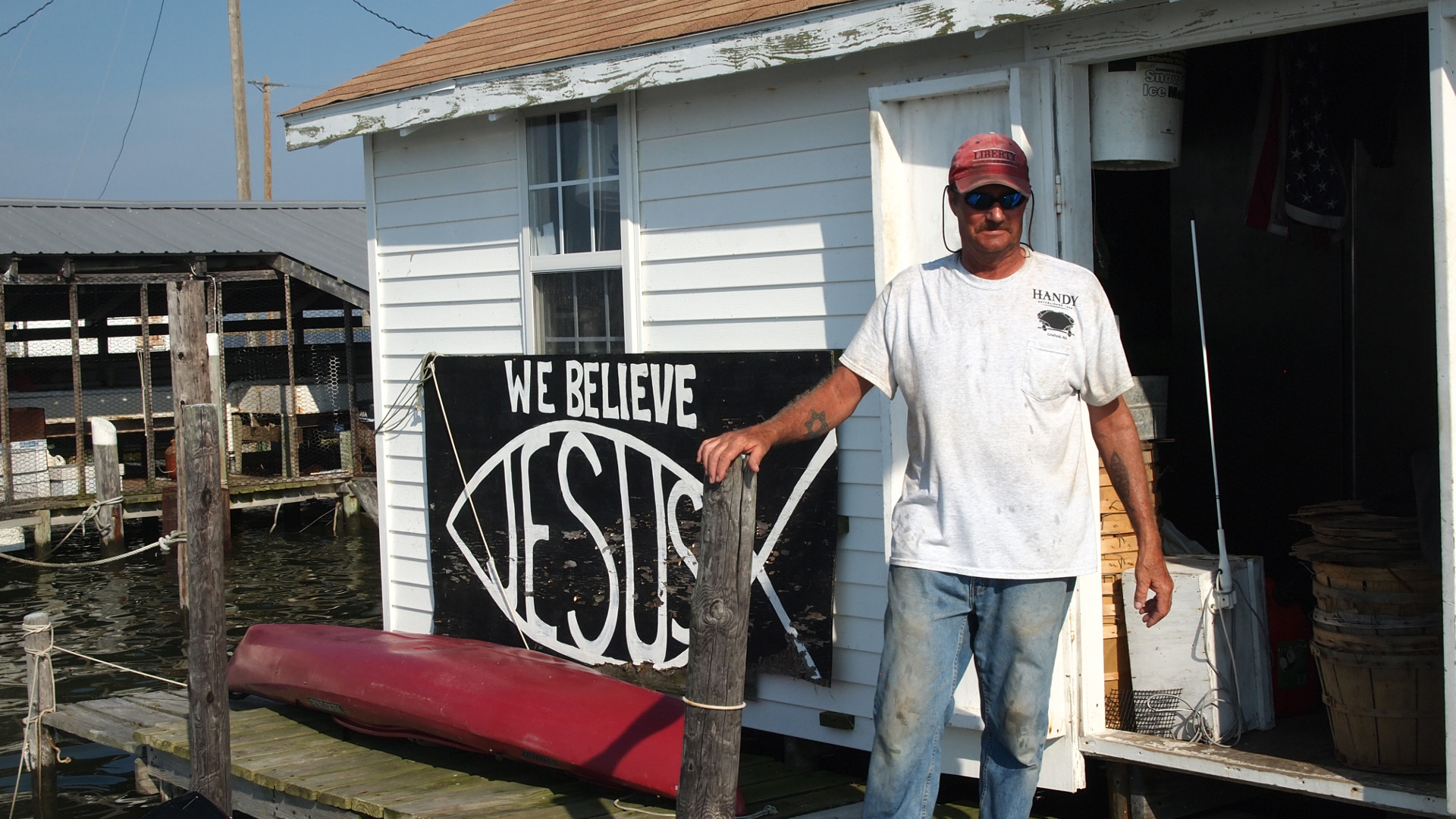The calls rolled in:
“I hope you sink.”
“You’re racist.”
“We’re going to boycott you.”
So it went for Mayor James “Ooker” Eskridge and the Chesapeake Bay island of 400 fishermen that he calls home: messages from people who knew nothing about Tangier Island or the long, frustrating and exhausting fight to save it.
The backlash began in June, when CNN aired a story on the Tangiermen’s struggles to secure a seawall that would shore up the island. The place is losing land at a rate of about 15 feet a year, and it doesn’t have much more to give. CNN’s report wouldn’t have been so different from other tales of towns losing their battles with climate change — except that Eskridge mentioned two things: He doesn’t believe the sea is rising, and he loves Donald Trump like a family member.
Trump, devoted CNN viewer that he is, called Eskridge and told him not to worry about his future.
“Your island has been there for hundreds of years,” he told Eskridge, “and I believe your island will be there for hundreds more.”
That phone call, recounted in The Washington Post, was apparently enough for strangers to reach out to the picturesque island and wish death upon it. The reaction surprised the mayor, who, like many on the island, works long days catching crabs and then overseeing the activities at his shedding shanty.
“People make comments about us. They don’t know us. They don’t understand us,” Eskridge told me. “If we disagree or we have a different way of thinking, that’s no reason to hate somebody or wish him dead.”

I do know Ooker Eskridge. I’ve been interviewing him for years. Along with my then-8-year-old daughter, I spent the better part of three days with him in 2014 to gather information for a couple of stories, and I’ve been back since, too. I know he can tell you as much about birds as any ornithologist. I know he has a pet osprey that returns every year to a platform he built near his shanty. I know he’s a devout Christian with a Star of David tattooed on his arm. I know he and his wife adopted a girl from India, Sreedevi, then adopted three more and helped others on the island do the same. He named his boat Sreedevi, in keeping with the tradition of a Chesapeake waterman naming his first boat after his daughter. She’s probably the only Sreedevi in a bay full of boats named Barbara and Anne. (And one Wicked Witch, and one Crazy Bitch, but that’s another story, and more likely to be about ex-wives than daughters.)
Some journalists would call Eskridge a climate denier, shoving him into a familiar place in a familiar debate between scientists and industry-backed “climate skeptics.” Maybe it’s easy to dismiss Eskridge as a man who ignores what’s plain to see. And maybe, for people who’ve gotten to be deeply intolerant of other points of view, it’s not much of a leap to say that he and his island deserve what they get.

But Eskridge doesn’t actually deny that the waters around his island are rising. He’s just convinced that the bigger problem is erosion. For decades he has pleaded with the U.S. Army Corps of Engineers to build him a seawall, like the one that already protects the island’s airport and does a great job at it. He even found a guy willing to sink barges off the coast to shore up the island. The federal government nixed the idea.
He’s not the only one in a slowly sinking boat. Denise Drewer, the mayor of tiny Saxis, Va. — another Eastern Shore island, this one connected to the mainland by road — has been begging the Corps for help. On Taylor’s Island, Bruce Colson is hoping the Corps will add dredge material to nearby James Island to protect his campground from encroaching water. In southern Dorchester County, council members want to protect schoolchildren who can’t get to the bus because of high water.
In all those places I’ve have reported on, people blame the problem on “erosion” and “tides.” No one’s talking about Arctic ice melt. On the Eastern Shore, the oceanographer Bill Boicourt once told me, opinions on climate change range from an “open skepticism to a closed skepticism.” But whatever they believe is causing the problem, the solutions are the same: Fortify with breakwaters and seawalls or plan an orderly retreat and settle elsewhere.
Eskridge — and Colson and Drewer and their neighbors — are not the political opportunists who deny climate change and then quietly ask oceanographers how much time their North Carolina beach house has. They’re farmers, fishermen, real estate agents, businesspeople and ministers. They are real people with real doubts and concerns. They are perspectives we can’t afford to ignore.
I can see why environmentalists would be dismissive of the idea that Donald Trump is going to solve such places’ problems. He wants to cut the Corps’ budget, which means that Tangier’s seawall is far less likely. He wants to cut NOAA, which will mean less planning for adaptation in coastal communities. The U.S. Geological Survey conducts key monitoring at tide gauges, and the U.S. Fish and Wildlife Service rebuilds habitat for birds, which can also protect populated islands; he wants to cut their budgets too. And of course, he wants big cuts at the Environmental Protection Agency, which is supposed to ensure the waters are clean enough for Tangiermen to keep crabbing for as long as they are able to stay.
Yet 87 percent of the Tangiermen voted for Trump. They backed him because, like millions of other Americans, they felt they had nothing left to lose. Maybe a billionaire, outside of the political system, would shake up Washington, pay attention to the rural areas, and give them the thing that could save them, whether it’s a bowling alley in South Carolina or a new factory in Ohio or some rock for a wall on Tangier. After years of false promises, Eskridge was elated that someone seemed to be listening. Whatever comes of Trump’s call, that’s something not to ignore, either.
© 2017 Rona Kobell. All rights reserved.
The opinions expressed above at those of the author and do not necessarily reflect those of The Revelator, the Center for Biological Diversity, or their employees.
Previously in The Revelator:



Decisions have consequences. When you vote for a “pull yourself up by your own bootstraps” philosophy – you shouldn’t be surprised when people turn around and tell you to “find those bootstraps and start pulling”.
I don’t wish anything bad on the people of Tangier Island but the Island has been disappearing since the middle of the 1800s (coincidentally around the start of the fossil fuel based Industrial Revolution). Using their preferred philosophy – if they needed a wall, they could’ve built one by now. They made a bad decision to continue living there while continuing to do nothing. Why should the rest of us fund that bad decision?
That is not how I think. But it is how =they= think about the calamities of others (as evidenced by their vote). Tangiers Islanders can move. The rest of us are dealing with the worst of the political decision they made – like trying to keep Medicaid cuts from causing nursing homes to kick octogenarians out onto the street. Yanno – the really vulnerable who truly can’t help themselves?
It’s really sad to see Trump once again pandering to supporters with misinformation and promises. Excellent article. The only issue I had with it is where you claim, “But Eskridge doesn’t actually deny that the waters around his island are rising.” Last night on CNN, Eskridge on multiple occasions clearly states he doesn’t believe sea levels are rising.
“If I see sea-level rise occurring, I’ll shout it from the house top. … I’m just not seeing it.”
“I’m not a scientist, but I’m a keen observer. And if sea level rise is occurring, why am I not seeing signs of it?”
Clearly he’s a climate-denier and sadly will watch his island drop into the bay around him because of is blind loyalty to Trump.
Oh, he’s on the verge of a breakthrough vegan ‘crab’ production and green shipping line if only the Army Core of Engineering will line up behind him. Kosher certification’s another year out. You just have to listen to his cover story for 6 hours for reasons.
Would be a good tail lede.
While personal attacks–especially supposed threats of violence–are clearly vile and inappropriate, it is not at all inappropriate to complain that Mr. Eskridge’s statements about sea level rise are wrong or point out the irony of his voting for a president whose policies will exacerbate his problems rather than fix them.
Mr. Eskridge chose to make his statements in a public forum as a public official. Thus people do not need to “know him personally,” as the author seems to suggest, to critically respond. That is the nature of public debate and Mr. Eskridge chose to inject himself into public debate.
More problematic though, is the author’s characterization of Eskridge and other Islanders as “hard working” “real people” being impacted/criticized by outsiders. The unstated implication is that the outsider critics are not hard-working, real people. This is an unfortunately common frame in environmental news stories. I can assure you that the Topeka pizza shop owner concerned with sea level rise is extremely hard-working and the Los Angeles cleaning woman worried about global warming is very real. Reporters need to take a hard look at the propensity to describe white male natural resource laborers as beleaguered, hard-working, real people and everyone else as outsiders or urbanites.
We will never get over the ideological and cultural divisions the author is concerned about if we keep describing or insinuating that one side of the division is populated by the real Americans. A good way to start is for reporters to eliminate the words “hard-working” and “real” as personal descriptors in stories about cultural and political disputes. They are divisive dog whistles when only applied to one side. And they’re tediously predictable when only applied to white working-class males.
Denying reality like global warming/climate change is not a “point of view” toward which sane people are intolerant. It is instead denial of reality because that person doesn’t like a certain reality (might cost them money, might have to change their environmentally harmful lifestyle, etc.). I have no tolerance for global warming/climate change deniers, and neither should any sane & reasonable person. Doing something to substantially affect this problem in a positive manner is hard enough without the illegitimate obstruction of these ignorant and/or immoral people.
This story reads far more like a right wing propaganda piece than real journalism. Pat and Kieran below expose some of the propaganda methods in this story, so I need not repeat them here. Suffice to say that I really don’t like reading stuff like this in what I thought was a publication related to the Center for Biological Diversity, because stories like this are in direct contradiction to what the Center stands for.
It wasn’t posited counter to biodiversity. It didn’t explain (well…there’s the guide at the local museum about how they talk in her earlier articles, linked…) a listenable component so much as saying that waterfowl will be required to corroborate anything from a Federal agency to see any kind of use or compliance, and that daily to-do yet turns on gas:meat turnaround. Catch turbot make tax-time. So if onshoring happens for him, the financial engineering class should have a cormorant in it…or such.
As mayor this person might have insights on juggling the town’s one time greatest costs, wastewater and solid waste management; or, exploding clowns and Indonesian-styled dartgunners. Even per se developing needed resistances to diseases carried by crabs, and wisdom of what algae will deter clams.
That’s charitable. How might I wish better things while engaging voluble chum aligned with the founts of bad choice? Let the bucket speak for 3.5 seconds…